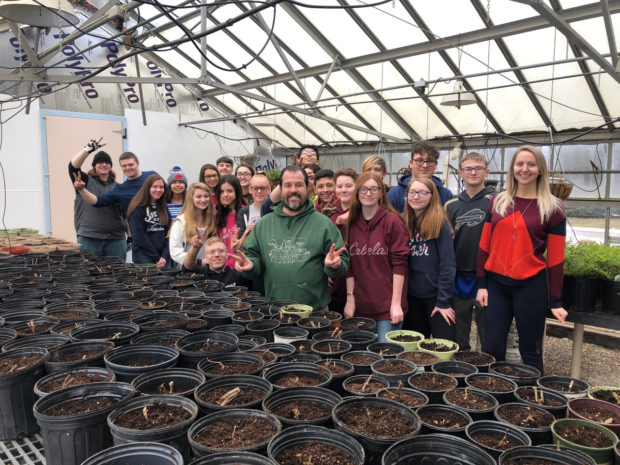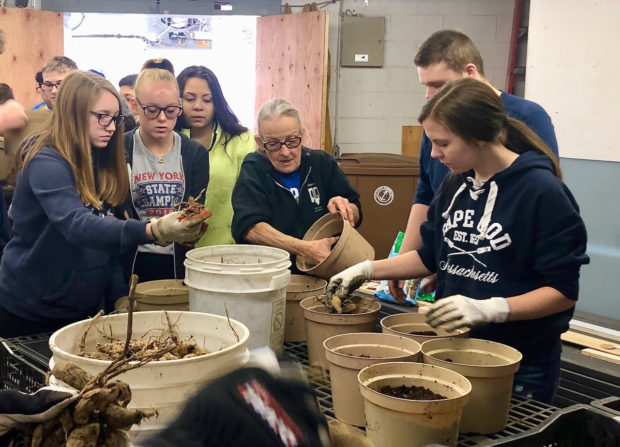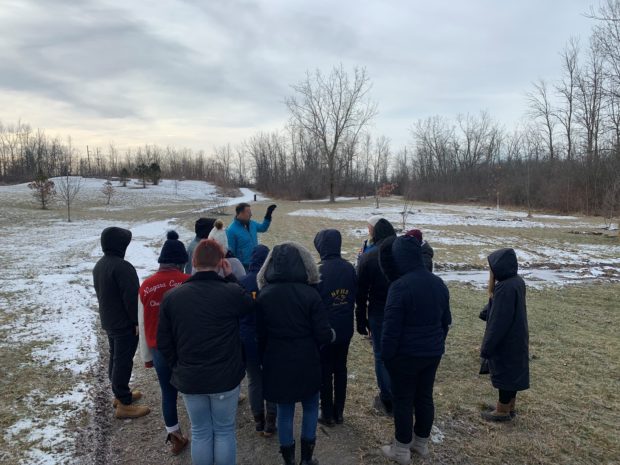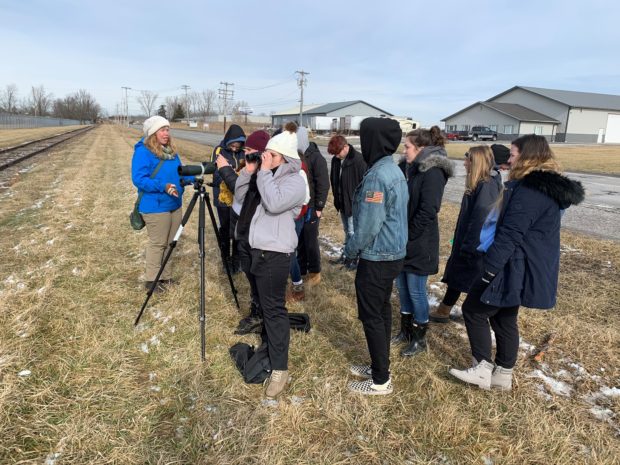We have much more to do and your continued support is needed now more than ever.
Exploring the Environment and Justice in Niagara County
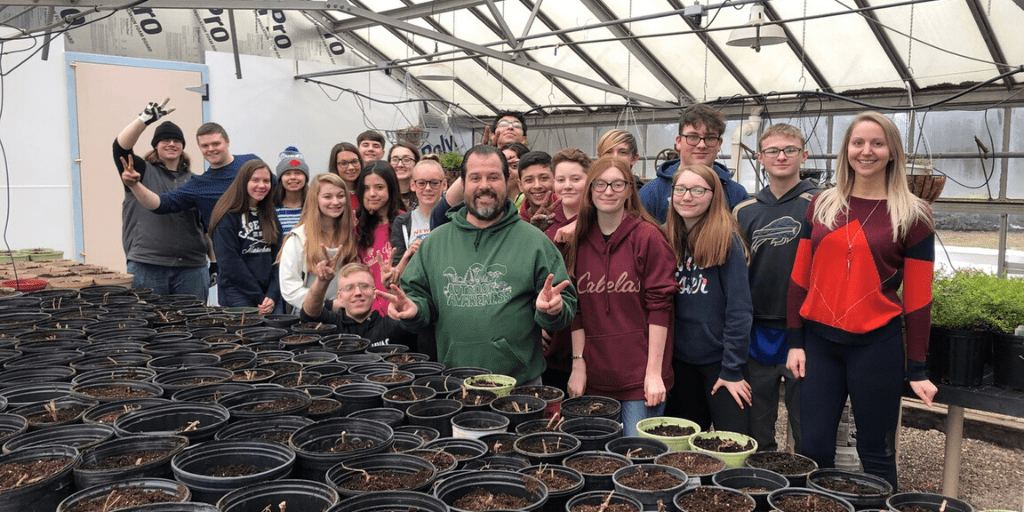
This school year marked the first year of “The Niagara County Youth Environmental Education and Leadership Program.” This multi-year program, created and funded by New York State Attorney General Letitia James and developed and implemented by a collaborative partnership between the National Wildlife Federation (NWF) and the Buffalo Niagara Waterkeeper (BNW), is focused on promoting environmental awareness, literacy, justice, and engagement among Niagara County, NY high school students living in the county’s four Potential Environmental Justice Areas designated by the New York State Department of Environmental Conservation.
While in-person learning and action opportunities were cut short this school year due to the unique challenges presented by the novel Corona virus pandemic, students still made great strides in learning about the environmental health and justice of their local communities and developing the leadership skills to address these issues in their schools and communities.
Niagara Falls High School
At Niagara Falls High School, students participated in the Young Environmental Leadership Program (YELP), an immersive college-credit class for students interested in Science, Technology, Engineering and Math (STEM) Fields to learn about the environmental issues in their neighborhoods, progressive solutions to these problems, and potential environmental careers.
Students had the opportunity to meet with and learn about the work and careers of local environmental justice leaders. This included a resident impacted by the Love Canal environmental tragedy of the 1970s, an environmental lawyer working to protect local waterways, and an environmental justice researcher, activist, and educator working on local issues. Students also took a number of outings to learn about and explore environmental issues first-hand.
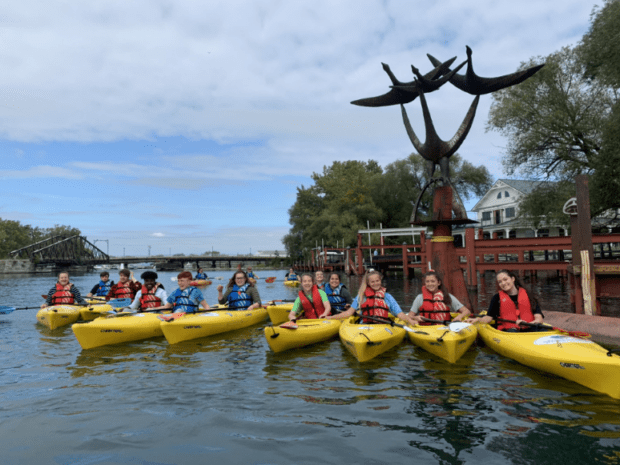
YELP students explored their local waterways by kayak, learning about how the Little Niagara River flows into the Niagara River which runs by their city while also observing hardened shorelines and discussing impacts to wildlife, water, and their community.
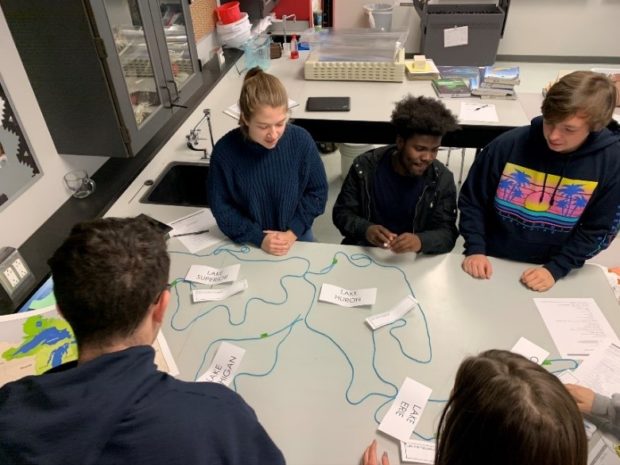
YELP students explored the Great Lakes utilizing an in-class, hands on activity highlighting the importance of freshwater lakes. Students matched shoreline length, water volume, amount of fish harvested, human population distribution and plastic pollution to the appropriate Great Lake.
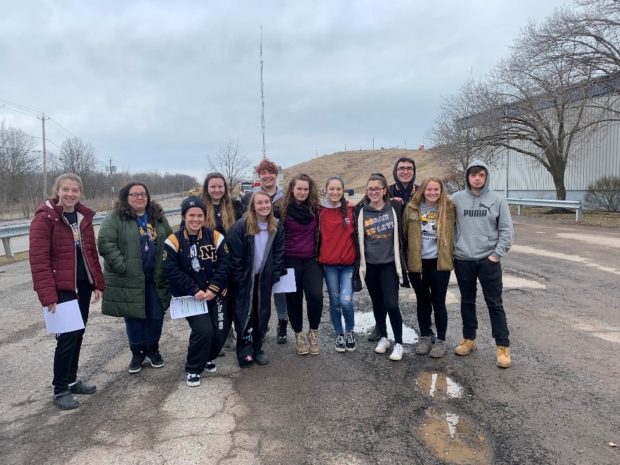
One of the last classes YELP students were able to participate in (in-person) was a trip to Modern Disposal – the dump! During this tour, students learned about the permit requirements needed as well as the day to day management of a landfill facility and the processes in place to protect groundwater from contamination.
Photos courtesy of Buffalo Niagara Waterkeeper.
Lockport High School
At Lockport High School, Earth Tomorrow club students utilized the Eco-Schools USA framework to conduct a school-wide environmental audit to better understand the environmental realities of their school. Informed by their findings, the students decided to pursue the waste/consumption pathway for their action project in which they planned and conducted a café waste assessment and development of a communications strategy to share their findings with the school.
The club considered the environmental justice implications of their waste assessment including where their school waste ends up, food security issues, the location of their local incinerator and costs to the school district. They then began the process of creating an educational campaign to run during school announcements and looking into purchasing a small fridge in the cafeteria to share un-used and unopened food, efforts that the students will continue and adapt accordingly next school year.
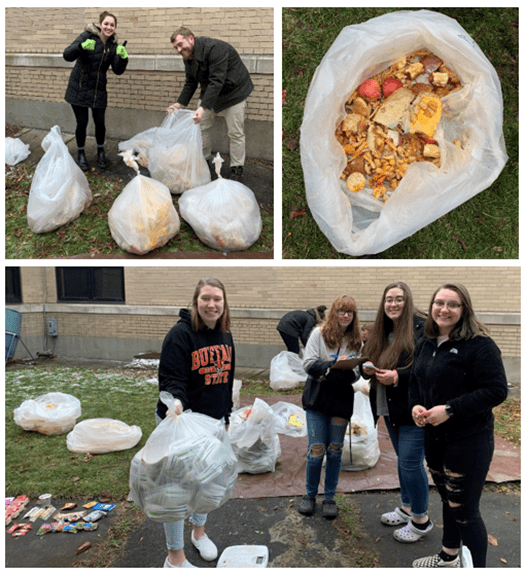
Additionally, students participated in a lesson delivered by BNW on birds in the Niagara River Important Bird Area and how birds can be used as a bioindicator to gauge the health of local ecosystems for people and wildlife. Plans were in action to run another lesson with students in the spring semester focusing on environmental Justice and local fish consumption.
Reflecting on her experience student, Angie Emmons shared the following thoughts:
Photos courtesy of Buffalo Niagara Waterkeeper.
“I found out anything can be fun if you’re doing it with friends! Also, the gratification of doing something good and working for change is like nothing else.”
North Tonawanda High School
The North Tonawanda High School (NTHS) Earth Tomorrow club participated in a number of on-the-ground learning opportunities and action projects this school year. Their first project was to assess and revamp the high school recycling program where they determined there was a need to develop an education campaign for their peers to show the importance of recycling. This resulted in the creation of a new labeling system for classroom recycling bins and a “how-to” video for proper sorting of recyclables.
Through this work, students examined community issues such as the disproportionate impacts on minority and low-income populations when hazardous materials are mismanaged and sent to recycling and analyzing the location of recycling facilities and their proximity and potential for impacts on nearby residents.
As well, students took a field trip to the North Tonawanda Water Treatment plant where they learned where their drinking water comes from, how it must be treated before it flows from the tap, and the great responsibility that comes with living so close to a freshwater source. Students engaged in a group reflection activity about water scarcity facts such as lack of access to clean water and how aging and deteriorating pipes can result in critical health issues such as lead in their drinking water.
NTHS students participate in a service project at North Tonawanda Botanical Gardens propagating Dahlias by separating last season’s tubers and planting them in pots to prepare for the upcoming season. The trip inspired the students to continue their work in designing a pollinator garden for NTHS. Photo credit: North Tonawanda High School.
The club’s second on-site project focused on supporting pollinator habitat by designing and converting their high school gardens into certified pollinator gardens. In addition to better understanding how creating habitat supports wildlife, students explored the relationship between pollinators and healthy environments to the health of their own food sources, particularly food security for marginalized communities in their region.
To further their knowledge of native plants and pollinators, students traveled to the North Tonawanda Botanical Gardens where they toured the grounds, learned about current and future projects involving living infrastructure and bioretention, and participated in a learning activity about pollinators through an activity led by BNW.
Niagara Wheatfield High School
The Niagara Wheatfield High School (NWHS) Earth Tomorrow club began their activities with an exploration of water quality and wildlife habitat through a field trip to explore Cayuga Creek where they examined a variety of active habitat restoration and conservation projects.
This included a stop at the headwaters of Cayuga Creek where Niagara-Wheatfield High School students and faculty are planning to protect the source by planting trees, creating a riparian buffer and considering other ways to improve shorelines for water quality and wildlife. As they moved through the process, they examined the connection between access to green natural spaces and improved mental health and an enhanced sense of community connection.
This resulted in students determining the need to create additional green space, including tree plantings and development of a pollinator garden. NWHS is also working with students and the school liaison from the Tuscarora Nation to deepen the program’s relationship with the Nation.
Niagara Falls High School Students explore Cayuga Creek restoration efforts. Photo credit: Buffalo Niagara Waterkeeper
A Strong Foundation
The first year of our the NCYEELP program was exciting, successful and challenging due to the COVID-19 pandemic. National Wildlife Federation, Buffalo Niagara Waterkeeper and our partner schools were able to establish a strong foundation for continued program work in the coming school years.
Even with the challenges of the pandemic, the schools were able to get their Earth Tomorrow clubs up and running, run a full semester YELP program at Niagara Falls High School and make progress towards sustainable actions in their school and communities. The building blocks have been put into place and we look forward to continuing to grow the infrastructure needed to ensure a sustainable, long term program in Niagara County.
Support our work to inspire and prepare the next generation of conservationists.
GIVE FOR WILDLIFE

